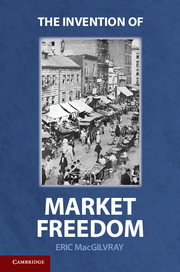Crossref Citations
This Book has been
cited by the following publications. This list is generated based on data provided by Crossref.
Thompson, Michael J.
2013.
A functionalist theory of social domination.
Journal of Political Power,
Vol. 6,
Issue. 2,
p.
179.
MacGilvray, Eric
2013.
Review Symposium: Free Market Fairness. By John Tomasi. (Princeton: Princeton University Press, 2012.).
The Journal of Politics,
Vol. 75,
Issue. 2,
p.
E10.
TAYLOR, ROBERT S.
2013.
Market Freedom as Antipower.
American Political Science Review,
Vol. 107,
Issue. 3,
p.
593.
MacGilvray, Eric
2014.
The Encyclopedia of Political Thought.
p.
3234.
Skinner, Daniel
2014.
Special Issue: Law and the Liberal State.
Vol. 65,
Issue. ,
p.
107.
Anderson, Elizabeth
2015.
EQUALITY AND FREEDOM IN THE WORKPLACE: RECOVERING REPUBLICAN INSIGHTS.
Social Philosophy and Policy,
Vol. 31,
Issue. 2,
p.
48.
Ascher, Ivan
and
Roberts, Will
2015.
Education and scholarship in the twenty-first-century marketplace.
Contemporary Political Theory,
Vol. 14,
Issue. 4,
p.
409.
Casassas, David
and
De Wispelaere, Jurgen
2016.
Republicanism and the political economy of democracy.
European Journal of Social Theory,
Vol. 19,
Issue. 2,
p.
283.
MacGilvray, Eric
2016.
LIBERALISM BEFORE JUSTICE.
Social Philosophy and Policy,
Vol. 33,
Issue. 1-2,
p.
354.
Pettit, Philip
2016.
A Brief History of Liberty—And Its Lessons.
Journal of Human Development and Capabilities,
Vol. 17,
Issue. 1,
p.
5.
Pettit, Philip
2017.
Human Development in Times of Crisis.
p.
169.
Pettit, Philip
2017.
Political realism meets civic republicanism.
Critical Review of International Social and Political Philosophy,
Vol. 20,
Issue. 3,
p.
331.
Klein, Steven
2017.
Fictitious Freedom: A Polanyian Critique of the Republican Revival.
American Journal of Political Science,
Vol. 61,
Issue. 4,
p.
852.
Sabl, Andrew
2017.
Realist liberalism: an agenda.
Critical Review of International Social and Political Philosophy,
Vol. 20,
Issue. 3,
p.
366.
Lobato, Carla Goncalves
2017.
Enforcing the Arm's Length Principle in the Knowledge-Based Economy: There Are No Winners, but All Are Losers.
SSRN Electronic Journal,
Loader, Ian
and
White, Adam
2017.
How can we better align private security with the public interest? Towards a civilizing model of regulation.
Regulation & Governance,
Vol. 11,
Issue. 2,
p.
166.
Dierksmeier, Claus
2018.
Qualitative Freedom and Cosmopolitan Responsibility.
Humanistic Management Journal,
Vol. 2,
Issue. 2,
p.
109.
Bloom, Peter
2018.
The Bad Faith in the Free Market.
p.
1.
Pyon, Kevin
2019.
Towards an African-American Genealogy of Market and Religion in Rap Music.
Popular Music and Society,
Vol. 42,
Issue. 3,
p.
363.
Elazar, Yiftah
and
Rousselière, Geneviève
2019.
Republicanism and the Future of Democracy.



